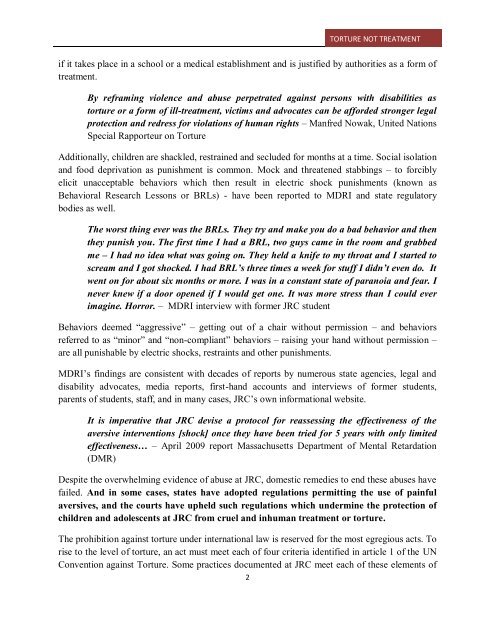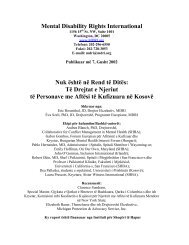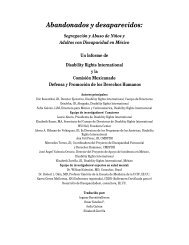Torture not Treatment - Disability Rights International
Torture not Treatment - Disability Rights International
Torture not Treatment - Disability Rights International
Create successful ePaper yourself
Turn your PDF publications into a flip-book with our unique Google optimized e-Paper software.
TORTURE NOT TREATMENT<br />
if it takes place in a school or a medical establishment and is justified by authorities as a form of<br />
treatment.<br />
By reframing violence and abuse perpetrated against persons with disabilities as<br />
torture or a form of ill-treatment, victims and advocates can be afforded stronger legal<br />
protection and redress for violations of human rights – Manfred Nowak, United Nations<br />
Special Rapporteur on <strong>Torture</strong><br />
Additionally, children are shackled, restrained and secluded for months at a time. Social isolation<br />
and food deprivation as punishment is common. Mock and threatened stabbings – to forcibly<br />
elicit unacceptable behaviors which then result in electric shock punishments (known as<br />
Behavioral Research Lessons or BRLs) - have been reported to MDRI and state regulatory<br />
bodies as well.<br />
The worst thing ever was the BRLs. They try and make you do a bad behavior and then<br />
they punish you. The first time I had a BRL, two guys came in the room and grabbed<br />
me – I had no idea what was going on. They held a knife to my throat and I started to<br />
scream and I got shocked. I had BRL‟s three times a week for stuff I didn‟t even do. It<br />
went on for about six months or more. I was in a constant state of paranoia and fear. I<br />
never knew if a door opened if I would get one. It was more stress than I could ever<br />
imagine. Horror. – MDRI interview with former JRC student<br />
Behaviors deemed ―aggressive‖ – getting out of a chair without permission – and behaviors<br />
referred to as ―minor‖ and ―non-compliant‖ behaviors – raising your hand without permission –<br />
are all punishable by electric shocks, restraints and other punishments.<br />
MDRI‘s findings are consistent with decades of reports by numerous state agencies, legal and<br />
disability advocates, media reports, first-hand accounts and interviews of former students,<br />
parents of students, staff, and in many cases, JRC‘s own informational website.<br />
It is imperative that JRC devise a protocol for reassessing the effectiveness of the<br />
aversive interventions [shock] once they have been tried for 5 years with only limited<br />
effectiveness… – April 2009 report Massachusetts Department of Mental Retardation<br />
(DMR)<br />
Despite the overwhelming evidence of abuse at JRC, domestic remedies to end these abuses have<br />
failed. And in some cases, states have adopted regulations permitting the use of painful<br />
aversives, and the courts have upheld such regulations which undermine the protection of<br />
children and adolescents at JRC from cruel and inhuman treatment or torture.<br />
The prohibition against torture under international law is reserved for the most egregious acts. To<br />
rise to the level of torture, an act must meet each of four criteria identified in article 1 of the UN<br />
Convention against <strong>Torture</strong>. Some practices documented at JRC meet each of these elements of<br />
2




